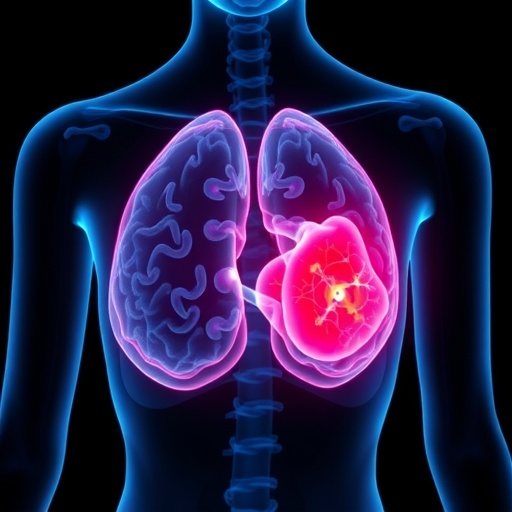Recent advancements in cancer research have heralded a new era in the understanding of breast cancer metastasis, particularly through the integration of bulk and single-cell transcriptomic analyses. Researchers are now poised to offer critical insights into how individual cancer cells behave and interact within the larger tumor microenvironment. The recent study led by Wu, Liu, and Xu represents a significant leap forward by identifying novel prognostic biomarkers linked to breast cancer metastasis, enhancing the potential for early detection and targeted therapies.
Breast cancer continues to be one of the leading causes of cancer-related mortality among women worldwide, and a significant part of this toll is attributed to metastasis. This is the process by which cancer cells spread from the original tumor site to other parts of the body, complicating treatment outcomes. Traditional methods of analyzing tumors through bulk transcriptomics—where the average gene expression across a population of cells is assessed—often mask the heterogeneity of tumor cells. Every tumor comprises a diverse population of cells that can respond differently to treatments, making it crucial to study these cells in detail.
The study in question innovatively combines bulk transcriptomics with single-cell analysis, providing a comprehensive view of the gene expression landscape in breast cancer. By examining both the average cellular makeup of tumors and the idiosyncratic features of individual cancer cells, the researchers were able to unravel complex interactions within the tumor microenvironment. This dual-approach allowed for the identification of key biomarkers that could serve as indicators of metastatic potential.
The compelling findings suggest that certain gene signatures are not only associated with aggressive tumor behavior but may also serve as predictive tools for patient outcomes. In practice, this could revolutionize how clinicians approach treatment plans, moving towards more personalized medicine. By focusing on specific biomarkers identified through this integrated analysis, physicians may be able to determine which patients are at higher risk for metastasis and tailor their therapeutic strategies accordingly.
Moreover, the implications of these findings extend beyond mere risk assessment. The identified biomarkers may also illuminate novel pathways for targeted therapies. For instance, if particular genes are implicated in metastatic behavior, pharmaceutical interventions designed to inhibit these pathways could be developed. This could lead to a significant reduction in metastasis rates and improved survival outcomes for patients.
The integration of single-cell and bulk transcriptomics is not just a methodological advancement; it underscores the necessity to embrace tumor complexity in cancer biology. As researchers like Wu and colleagues delve deeper into the cellular intricacies of breast cancer, the hope is that these insights will pave the way for transformative innovations in treatment and patient care.
These breakthroughs highlight the need for continued investment in advanced genomic technologies. The tools that allow for such comprehensive analyses are rapidly evolving, enabling scientists to construct more nuanced maps of tumor evolution and heterogeneity. In the near future, these technologies could become standard practice, facilitating more precise interventions during various stages of cancer progression.
Nothing compares to the power of single-cell analysis when it comes to understanding the dynamic behavior of tumor cells. The granularity of this approach is essential for identifying rare cell populations that may significantly influence tumor behavior. By understanding how these cells contribute to metastasis, researchers hope to develop strategies to target them specifically, potentially preventing the spread of cancer to distant organs.
Additionally, the findings from this study suggest that time is of the essence in the management of metastatic breast cancer. With effective biomarkers now identified, the potential for earlier intervention is significant. This could drastically alter patient trajectories by catching metastasis sooner, impacting patient care profoundly.
As the research community continues to unveil the molecular mechanisms underlying metastasis, collaborative efforts are crucial. Integrating data across various studies can accelerate the development of effective treatment strategies. The ongoing dialogue between clinical and experimental researchers will ensure that promising findings translate into real-world applications that benefit patients.
The insights derived from this integrated approach do not merely add to the scientific knowledge base; they have real and tangible implications for patients battling breast cancer. As the nexus of cancer research grows increasingly sophisticated, the hope remains that such innovative studies will culminate in breakthroughs that not only extend lives but also enhance the quality of life for patients diagnosed with cancer.
In conclusion, the study led by Wu, Liu, and Xu exemplifies how the marriage of cutting-edge genomic technologies can redefine our understanding of cancer metastasis. By weaving together bulk and single-cell transcriptomics, the researchers have unearthed crucial prognostic biomarkers that hold promise for the future of personalized cancer care. As more studies of this nature emerge, the potential for revolutionizing treatment paradigms in oncology becomes ever more attainable.
Subject of Research: Integrated analysis of bulk and single-cell transcriptomics in breast cancer metastasis.
Article Title: Integrated Analysis of Bulk and Single-Cell Transcriptomics Identifies Prognostic Biomarkers in Breast Cancer Metastasis.
Article References: Wu, QQ., Liu, K., Xu, JF. et al. Integrated Analysis of Bulk and Single-Cell Transcriptomics Identifies Prognostic Biomarkers in Breast Cancer Metastasis. Biochem Genet (2025). https://doi.org/10.1007/s10528-025-11228-7
Image Credits: AI Generated
DOI: 10.1007/s10528-025-11228-7
Keywords: Breast cancer, metastasis, transcriptomics, biomarkers, single-cell analysis, personalized medicine, cancer research, gene expression, tumor microenvironment.




